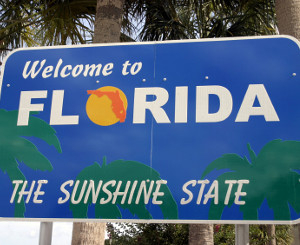 Located in the south-eastern United States, Florida is the nation's fourth largest state in terms of population. An enormous peninsula that separates the Atlantic Ocean from the Gulf of Mexico, Florida is characterized by a subtropical climate in the north and a true tropical climate in the south.
Located in the south-eastern United States, Florida is the nation's fourth largest state in terms of population. An enormous peninsula that separates the Atlantic Ocean from the Gulf of Mexico, Florida is characterized by a subtropical climate in the north and a true tropical climate in the south.
Although popular images of Florida often focus on the thriving beach areas that have long been considered a vacation paradise, the inland area of the state offers just as much in terms of recreation and entertainment. Extensive networks of rivers and lakes provide opportunities for fresh-water fishing, while tourist attractions such as the Disney family of amusement parks are among the most visited entertainment sites on earth. Without the contributions made by the state of Florida, the United States would be a different nation indeed.
History of Florida
The name of Florida is derived from the region's early history. Ponce de León, a conquistador sailing for Spain, is thought likely to have been the first European to make landfall in the state. He dubbed the region "La Florida" (the flowering land) in homage to the magnificent blooms he saw upon landing in April 1513. In the years that followed, both Spanish and French colonies were to spring up, but by 1763, Great Britain's victory in the Seven Years War granted it full control of Florida. This British dominance was short-lived; when the Americans won their war for independence, Spain regained control of the region, only to cede it to the United States in the early 1800s.
Florida became the 27th state in the Union in 1845, but seceded from the Union to side with the South during the Civil War. After the Confederacy lost the war, Florida once again became a part of the United States, though it remained the least populous state in its region until the middle of the 1900s. This began to change with the invention of air conditioning, which allowed people to enjoy both indoor comfort and the benefits of a tropical climate. Now, Florida has a population of nearly 20 million, making it the most heavily populated state in the south-eastern part of the country.
Culture, food and drink
Florida's vibrant mix of ethnicities contributes to a culture that draws its roots from all over the world, yet the various regions that make up the state each have their own unique character. Miami and the other cities that dot the southern Atlantic coastline have been transformed by two separate waves of Cuban immigration that have given them a distinct Caribbean flair. Meanwhile, areas in the northern "panhandle" of the state retain a more traditional Southern US culture. In contrast, thriving Puerto Rican communities characterize the Gulf Coast city of Tampa and the vacation playground of Orlando.
The diverse history of this state means that many Florida residents can trace their ethnic roots to places such as Germany, Ireland, Italy, Poland and the British Isles, in addition to West Africa. This multi-ethnic environment causes local foods and drinks in Florida to vary widely across the state. In Miami, the dominant cuisines are Cuban, Caribbean, and Mexican, while Orlando's International Drive offers visitors a cornucopia of choices, including Spanish tapas (appetizers), Asian specialties, and fondue, a European delicacy.
Still, some common themes do prevail throughout the state. Since ocean surrounds most of Florida, seafood is understandably popular; one of the state's unique specialties is the stone crab, which is not available fresh in any other region. The state's signature dessert is the Key Lime pie, made of tiny limes that grow on the Florida Keys, an island chain located south of the Florida mainland.
Wine and beer are popular beverage choices, but ethnic restaurants often offer special preparations that are not commonly seen in American-themed restaurants. These include sangria, a Spanish preparation of red wine and fruit juices, and horchata, a non-alcoholic sweet Mexican beverage made of rice and cinnamon.
Things to do and see in Florida
Florida is world-famous for its amusement parks. These include Disney World, Universal's Islands of Adventure, and Sea World, among many others. Nowhere else in the United States is there such a concentration of amusement parks as can be found in the city of Orlando, a veritable Mecca of entertainment.
However, Florida also has much else to offer. The Everglades National Park, the largest subtropical stretch of wilderness in the nation, attracts more than a million visitors each year to the southern tip of the state. The United Nations has designated the area as a wetland of global importance - one of only three such locations on earth. The Everglades has also provided a national model in terms of wetland preservation and restoration, making Florida a prime source of environmental leadership in the United States.
Florida is also home to the "Space Coast" where flight missions that included moon landings and space shuttle launches have lifted off. The Kennedy Space Center, located just an hour outside of Orlando, provides the public with guided tours that demonstrate the importance of Florida in the Cold War competition known as the "Space Race."
Above all Florida is a beach paradise enjoyed by locals and visitors alike. With more than 1,000 miles of beautiful coastline, Florida offers ample opportunities to enjoy coastal and deep-sea fishing as well as water sports, such as surfing, swimming, snorkeling, and scuba diving.
Florida's political and economic significance
Americans are reminded of the importance of Florida with every presidential election cycle. Not only does the state hold a large number of the electoral votes by which the president is ultimately elected, it is also considered a "swing state" that is not firmly held by either party. Indeed, the Florida vote was the deciding factor in the 2000 election between George W. Bush and Al Gore. In the end, Bush gained the presidency because the Florida vote count was decided in his favor.
Florida also encompasses tremendous economic importance for the nation as a whole. The state's major industries include fishing, agriculture, mining, aerospace, and tourism. Warm weather and ideal growing conditions mean that Florida's orchards provide almost three-quarters of all oranges grown in the United States, along with tremendous volumes of other citrus fruits.
Florida provides numerous older Americans with a new community to enjoy during their golden years; the state is among the most popular in the nation for retirement communities.
Real estate is also a significant economic sector. Unlike in many other parts of the nation, housing demand continues to grow in Florida, with sales of existing homes leaping 21% between 2009 and 2010.
Since the early days of North American colonization, Florida has been significant in the development of the United States, but it is only since the middle of the 20th century that the state has truly found its "place in the sun." Now well into the new millennium, Florida occupies not only a central position in US politics, but also provides its fellow states with a modern understanding of what the term "American" truly encapsulates: a thriving, multi-ethnic society that contributes to the betterment of the whole nation.
Why not take a look at our property and land for sale in Florida - click here for more information.
Or click here to download our lastest price lists and brochures













